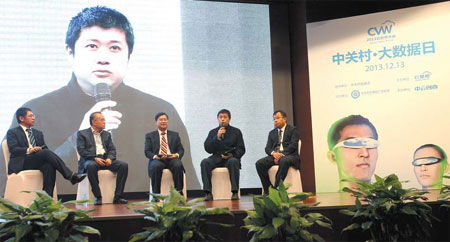|

Panelists discuss how big data affects businesses and society. Zhang Wei / China Daily
|
The emerging big data industry has been reshaping business models and lifestyles in recent years and will grow into an engine to drive the global technical revolution, said officials and industry insiders at the second Big Data Day forum in China's innovation hub Zhongguancun last week.
Big data, as "a carrier of human knowledge and information", integrates many new technologies, such as cloud computing, the Internet of Things and wearable terminals, said Xuan Hong, deputy director of the Zhongguancun administration, at the forum.
It also has helped bring advances in many traditional industries, including agriculture, manufacturing and the service sector, he said.
David Feinleib, a Silicon Valley venture capitalist, said big data is "not just what happens at work but also how it can affect our personal lives - how we can live healthier and more productive lives using big data".
Feinleib is the creator of the "Big Data Landscape", a chart that maps out companies involved in different categories in the big data industry, including technologies, infrastructure and apps. There were only some 30 companies in the "landscape" when it was first made in June 2012, but now the number is more than 100.
He said the major development of big data in the future will be in the application level, such as e-business, financial services and public transportation.
Jiang Xiaodan, president of Zhongguancun-based Smartdot Technology Development Co, said that the government should be "a supporter, practitioner and protector" in the big data industry.
"As an emerging sector, the big data industry will sure lead to restructuring of technologies and new forms of services, and the government must adjust itself to the changing situations," he explained.
"At the same time, the government itself is the owner of plenty of detailed data," he said. "The government could open the resources to manage the society in a more efficient way."
But on the other hand, the industry will also bring about problems and challenges, such as privacy protection, he added, suggesting the government should establish new regulations in response.
"The government should play a role that the companies and scholars cannot," said Pan Zhuting, deputy secretary-general of the Task Force on Big Data at the China Computer Federation.
"All it has to do is to maintain a sound business environment, so that the industrial and academic circles can fully display their talent."
Deputy Director Xuan agreed with them.
"The government will link different companies and institutions, to help them integrate technology with the market," he said. "We will follow the market in the building of the industry chain as long as the companies are capable enough."
He said the Zhongguancun administration will launch a 750 million yuan foundation in the coming year to support start-ups in a number of key industries and encourage more venture capital investment into the emerging industries.
He said in Zhongguancun, the big data and mobile Internet industries create annual revenue of more than 500 million yuan ($82.4 million). More than 100 companies have been involved in the big data industry, ranging from hardware to applications and services.
The area is home to the information centers of more than 20 ministries and R&D facilities of China's three telecommunication operators - China Mobile, China Telecom and China Unicom. There are also many international research institutions and big data companies.
The big data industry is now bringing fundamental changes to businesses and the society.
For instance, China Unicom has more than 2 trillion entries of Internet history from its users every month. The online search engine developer Baidu deals with around 600 million search requests a day, processing 100 terabytes of data.
Using the BeagleData system developed in the cloud computing base in Beijing's Yizhuang area, police can find suspects and describe their relationship in a few seconds by analyzing train tickets and hotel check-in information, which might require days of work with traditional investigation methods.
zhangzhao@chinadaily.com.cn
|

Venture capitalist David Feinleib and Zhongguancun administration's deputy director Xuan Hong speak to the forum. Zhang Wei / China Daily
|








